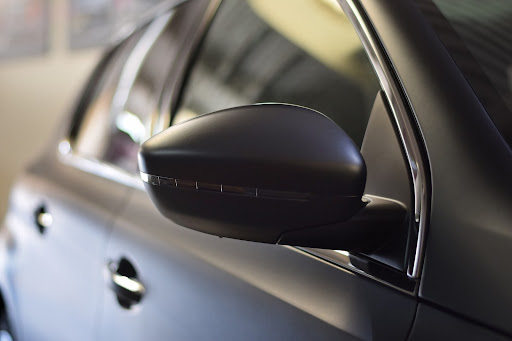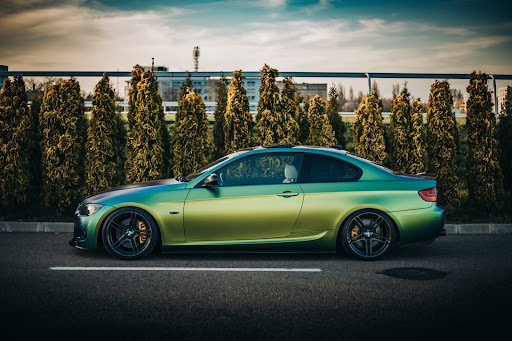Car wrapping is a growing industry that offers plenty of opportunities for those seeking a creative and lucrative profession. You can work with an array of materials on cars, trucks, vans, and RVs. Pair this with the low barrier to entry, and you’re on your way to making an extra $100,000 annually. If you’re ready to start your car wrapping career, keep reading to learn more about next steps
What are Car Wraps
Car wrapping is the process of covering a car in vinyl to change the way it looks. This can mean a new color, design, or even texture – like matte or gloss. With the modern development and popularity of car wraps, clients can put their personal stamp on their car.
How Do They Work?
When deciding on a car wrap, customers can choose between a partial and full wrap. Then, specific car measurements are taken so the chosen wrap fits the vehicle perfectly. A special coating is used to maximize scratch and UV protection. This ensures that your car’s bodywork is protected, and that the wrap doesn’t fade when exposed to the elements.
Once that step is complete, the car should be thoroughly cleaned and dried. Next, the surface is sprayed with water and a special solvent, ready for the wrap. Finally, the wrap can be applied to the car.
The vinyl wrap is essentially a huge decal that is applied to the desired panel(s) of a vehicle. When ready to apply, the backing is removed and the vinyl is smoothed onto the car to remove air bubbles.

Low Barrier to Entry
Vinyl wrapping has a low barrier to entry. Even better, if you already offer other auto reconditioning services, you’ll have a running start on overhead costs.
Materials can range between $300-$700, up to $2,500 for less common wraps, like chrome. The average cost of a car wrap, however, can range between $2,000 and $5,000. For specialized car wrapping, you can expect to charge upwards of $10,000, so the profit margin is high.
Let’s create an example. If you wrap one car a week and charge $2,500 per wrap, you’ll be making $10,000 a month. The more cars you’re able to wrap a week, the more your monthly profit will skyrocket.
Partial wrapping can cost around $300, so even smaller jobs will still bring in a profit. Individual car part wraps, like headlights and window tints, can also help increase business. They take less time to perform, making it easier to service more cars in a given period.
Setting Prices for Your Car Wrap Business
PDR is a much quicker process than traditional dent repair. Typically PDR shops will offer same-day Because the price can vary so much, it can be hard to decide what your business should charge. Some detailers base their car wrap prices on a cost-per-foot method, but this leaves out other important factors. Here are some pricing variables you should consider:
When you use Mobile Tech RX, your efficiency will increase tenfold. Everything from scanning the car’s VIN, creating estimates, and collecting payment run smoothly with the app. The more vehicles you service, the more money you make. It’s a win-win for you and your customers.
Customers Spend Less, You Make More
Customers are usually more interested in PDR when they see the hefty price that comes with traditional dent repair. Traditional dent repair involves painting, blending adjacent panels, removing the trim, and baking the paint. Because this takes more time and attention from technicians, it’s easy to understand where the price tag comes from. PDR can fix the same small dent at a fraction of the cost of traditional dent repair. More customers are willing to pay for PDR, which means you’ll earn a high profit.
- Size of the vehicle: This is the cost-per-foot method most detailers use. Larger vehicles will cost more to wrap than smaller vehicles.
- Type of vehicle: In addition to the size of the vehicle, the type of vehicle will affect the cost. Some vehicles have more intricate curves and crevices. Other vehicles, like RVs, have more flat surfaces that are easier to detail.
- Wrap coverage: Partial wraps on the door, hood, or trunk will cost less than a full wrap.
- The vehicle’s condition: If a vehicle’s exterior is badly scratched or oxidized, the wrap will not adhere as easily to the paint. This will take more time for your technicians to complete, so you should factor it into your car wrap price.
- The type and quality of the wrap: There are many different types and brands of car wrap. The more expensive options will have a better finish and last longer than cheaper versions.

Use Technology To Your Advantage
Variable-based pricing only works when it’s well thought through. You want to make sure that the car wrap prices you set are consistent. The best way to set accurate and consistent car wrap prices is by taking advantage of technology. With the Mobile Tech RX app, designed specifically for car wrapping business, you won’t have to think twice.
Using the app, you set prices ahead of time in the admin portal. This includes hourly labor rate and flat rate variables. These prices are then programmed into the app, so when building an estimate, you’re never leaving money on the table.
The Mobile Tech RX car wrapping app allows you to:
- Document pre-service damage with photos and notes
- Built fast estimates with pre-set packages
- Customize pricing by panel and type of material
Essentially, you’re ensuring that your car wrap prices are high enough for profitability and accurate enough to avoid undercharging. Customers won’t second guess your estimates, because they’re built with technology.
Start Your Car Wrapping Business with The Help of Mobile Tech RX
Automotive paints use solvents like urethane, lacquer, and enamel that can be harmful to the environment. There is no paint involved in PDR so these solvents won’t affect the environment during the process. It also involves less material overall, which helps to reduce waste (and the cost of business).
Say Goodbye to Insurance Counteroffers.
PDR is already preferred by insurance companies over traditional dent repair. Plus, insurance companies take Mobile Tech RX seriously. The estimates are accurate because they’re backed by tools like the PDR matrix and comparative pricing. Auto shop owners who use Mobile Tech RX never have to worry about insurance counteroffers.
Get Started With Mobile Tech RX
If you haven’t already considered offering PDR, we hope this article will change your mind. PDR does require training, but uses a minimal selection of tools. It has a low barrier to entry and earns a high profit. PDR is much more efficient than traditional dent repair, and customers recognize this. With Mobile Tech RX, you’ll have access to the best PDR estimating resources. You’ll even be able to schedule, check-in vehicles, and close estimates in a fraction of the time.
Start your journey today with a free trial of the leading auto reconditioning business app
